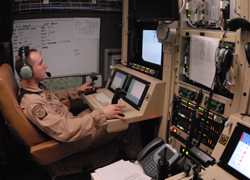
One argument against the unmanned drones that the United States currently uses in combat in Iraq and Afghanistan and against terrorist targets in Pakistan, Yemen and Somalia is that because the drone pilot sits thousands of miles away from combat, operating the drone remotely, killing is easier — more akin to a video game than real combat. The argument goes that if killing is easier, the soldiers will be more prone to use lethal force.
Proponents argue that this kind of killing isn’t easier because the remote soldier isn’t in the combat theatre where soldiers are in an environment where killing is the norm and they have comrades with whom to process the experience. Drone pilots kill during the day, go home after work and coach their kids soccer games. The theater of war, this argument goes, engenders battle hardened soldiers who become more acclimated to combat and killing.
In any case, proponents argue that removing the warrior from the heat of battle allows him to be more contemplative and careful since his own safety is not at risk. ABC news aired a segment that illustrated how patient remote warriors can be:
David Muir, Inside the Drone War: On the Ground and in the Virtual Cockpit With America’s New Lethal Spy, ABC News, Jan. 12, 2010, http://abcnews.go.com/WN/inside-predator-drones-game-changing-technology-war-afghanistan/story?id=9543587.
To my knowledge, there is no study on whether remote killing is harder or easier than traditional combat tactics. Any thoughts out there?


